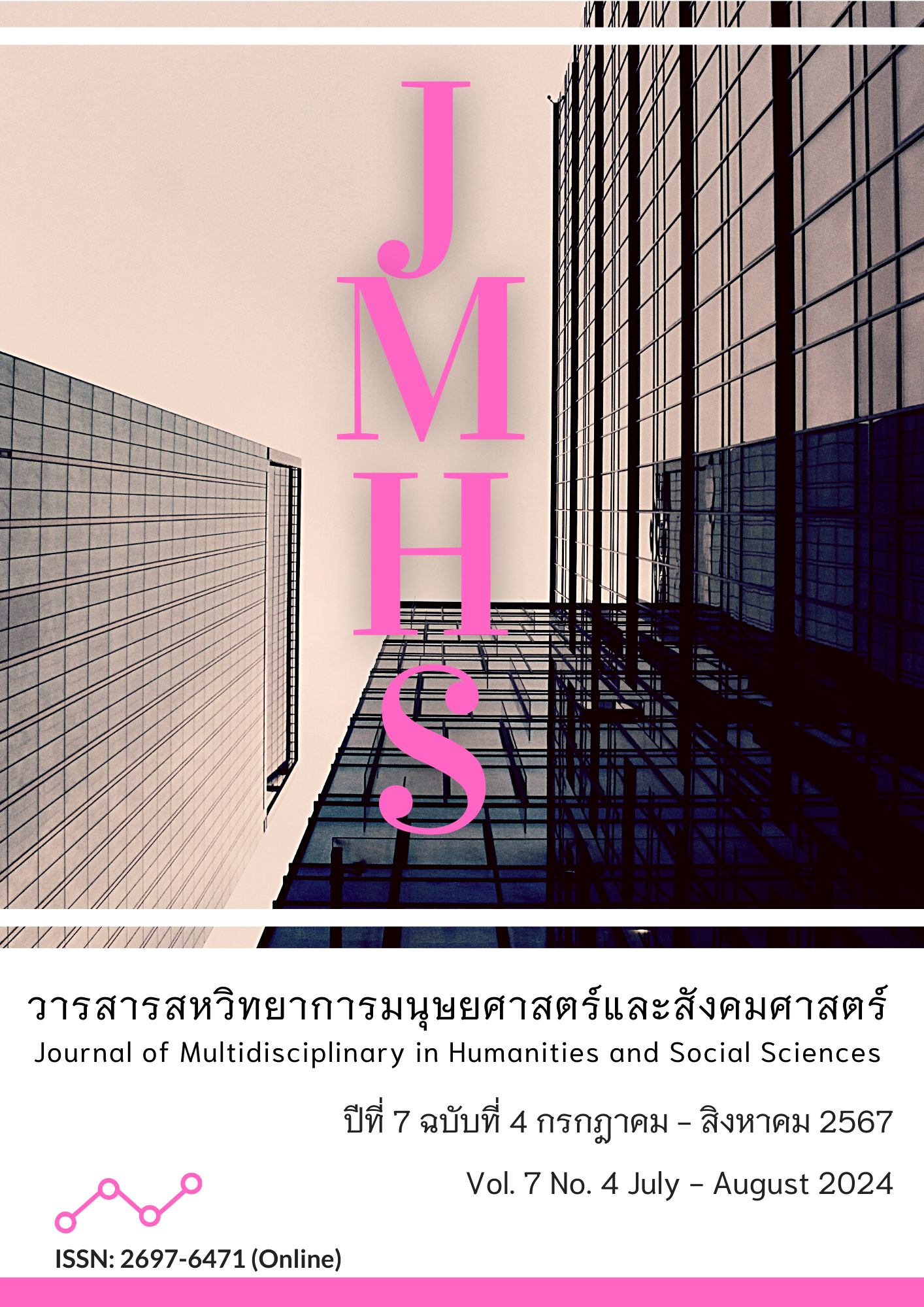การศึกษาองค์ประกอบและตัวบ่งชี้การบริหารเพื่อสนับสนุนอุตสาหกรรมท่องเที่ยวของสถานศึกษา สังกัดสำนักงานคณะกรรมการการอาชีวศึกษา
Main Article Content
บทคัดย่อ
ปัจจุบันมีรายงานผู้สำเร็จการศึกษาประเภทวิชาอุตสาหกรรมการท่องเที่ยวจากสถานศึกษา สังกัดสำนักงานคณะกรรมการการอาชีวศึกษา มีจำนวนลดน้อยลง ทำให้การขับเคลื่อนกำลังคนด้านเศรษฐกิจการท่องเที่ยวของประเทศไทยไม่สอดคล้องกับแผนพัฒนาเศรษฐกิจและสังคม ฉบับที่ 13 บทความนี้ มีวัตถุประสงค์เพื่อศึกษาองค์ประกอบและตัวบ่งชี้การบริหารเพื่อสนับสนุนอุตสาหกรรมท่องเที่ยวของสถานศึกษา สังกัดสำนักงานคณะกรรมการการอาชีวศึกษา เป็นการวิจัยเชิงเอกสารและการสัมภาษณ์ โดยคัดเลือกแบบเจาะจง เก็บรวบรวมข้อมูลเพื่อให้ได้องค์ประกอบหลัก องค์ประกอบย่อย และตัวบ่งชี้ โดยการสัมภาษณ์ผู้ทรงคุณวุฒิ จำนวน 10 คน โดยใช้แบบสัมภาษณ์กึ่งโครงสร้าง และสอบถามผู้ทรงคุณวุฒิ จำนวน 8 คน โดยใช้แบบสอบถาม วิเคราะห์ข้อมูลโดยการวิเคราะห์เนื้อหาแล้วเขียนบรรยายเชิงพรรณนา ผลการวิจัยพบว่า องค์ประกอบและตัวบ่งชี้การบริหารเพื่อสนับสนุนอุตสาหกรรมท่องเที่ยวของสถานศึกษา ประกอบด้วย 4 องค์ประกอบหลัก 10 องค์ประกอบย่อย 103 ตัวบ่งชี้ ได้แก่ 1. ด้านปัจจัยนำเข้า ประกอบด้วย 1) นโยบาย จำนวน 13 ตัวบ่งชี้ 2) การพัฒนาหลักสูตร จำนวน 7 ตัวบ่งชี้ 3) บุคลากร จำนวน 8 ตัวบ่งชี้ และ 4) ด้านผู้เรียน จำนวน 5 ตัวบ่งชี้ 2. ด้านกระบวนการประกอบด้วย 1) การสร้างเครือข่าย จำนวน 14 ตัวบ่งชี้ 2) การบริหารจัดการ จำนวน 7 ตัวบ่งชี้ 3) การพัฒนาครูและบุคลากร จำนวน 6 ตัวบ่งชี้ และ 4) การนิเทศและวัดประเมินผล จำนวน 4 ตัวบ่งชี้ 3.ด้านผลผลิต ประกอบด้วย สมรรถนะวิชาชีพผู้สำเร็จการศึกษา 6 ตัวบ่งชี้ คุณธรรมและจริยธรรมของผู้สำเร็จการศึกษา 9 ตัวบ่งชี้ 4.ด้านสภาพแวดล้อม ประกอบด้วย 1) ด้านการเมือง จำนวน 8 ตัวบ่งชี้ 2) ด้านเศรษฐกิจ จำนวน 9 ตัวบ่งชี้ 3) ด้านสังคม จำนวน 9 ตัวบ่งชี้ และ 4) ด้านเทคโนโลยี จำนวน 9 ตัวบ่งชี้
Article Details

อนุญาตภายใต้เงื่อนไข Creative Commons Attribution-NonCommercial-NoDerivatives 4.0 International License.
ทัศนะและความคิดเห็นที่ปรากฏในวารสาร ถือเป็นความรับผิดชอบของผู้เขียนบทความนั้น และไม่ถือเป็นทัศนะและความรับผิดชอบของกองบรรณาธิการ
เอกสารอ้างอิง
กรมการท่องเที่ยว. (2558). มาตรฐานการจัดบริการในสถานประกอบการท่องเที่ยวเชิงสุขภาพ. กระทรวงการท่องเที่ยวและกีฬา.
กองเศรษฐกิจการท่องเที่ยวและกีฬา สำนักงานปลัดกระทรวงการท่องเที่ยวและกีฬา. (2562). สรุปขีดความสามารถในการแข่งขันด้านการท่องเที่ยวของไทย ปี พ.ศ. 2562. สืบค้นจาก https://www.mots.go.th/download/article/article_20190925130927.pdf
กระทรวงศึกษาการ. (2560). คุณวุฒิวิชาชีพสาขาวิชาชีพการท่องเที่ยวการโรงแรม ภัตตาคารและร้านอาหาร สาขางานโรงแรม อาชีพพนักงานบริการส่วนหน้าของโรงแรม ระดับ 2. สืบค้นเมื่อ 15 กรกฎาคม 2566, จาก https://tpqi-net.tpqi.go.th/qualifications/3753
จงสถาพร ดาวเรือง. (2560). อนาคตภาพการอาชีวศึกษาระบบทวิภาคีของสถานศึกษา สังกัด สำนักงานคณะกรรมการการอาชีวศึกษาในทศวรรษหน้า (พ.ศ. 2559-2569)(วิทยานิพนธ์ ปริญญาปรัชญาดุษฎีบัณฑิต). มหาวิทยาลัยราชภัฏราชนครินทร์.
ฐานรินทร์ หาญเกียรติวงศ์ และ รุจิกาญจน์ สานนท์. (2021). การพัฒนาศักยภาพเครือข่ายความร่วมมือด้านการท่องเที่ยวอย่างยั่งยืนของชุมชนแห่งหนึ่งใน ตำบลห้วยแก้ว อำเภอแม่ออน จังหวัดเชียงใหม่. วารสารวิชาการสังคมศาสตร์เครือข่ายวิจัยประชาชื่น, 3(1), 1-14.
ประกาศกระทรวงศึกษาธิการ. (2561, 18 กันยายน). เรื่องมาตรฐานการอาชีวศึกษา มาตรฐานที่ 1 คุณลักษณะของผู้สำเร็จการศึกษาอาชีวศึกษาที่พึงประสงค์.
ประกาศกระทรวงศึกษาธิการ. (2562, 6 มีนาคม). เรื่อง กรอบคุณวุฒิอาชีวศึกษาแห่งชาติ พ.ศ. 2562.
ปริยาภัทร ศรีเพชร. (2559). แนวทางการพัฒนาศักยภาพในการปฏิบัติงานของบุคลากรหน่วยงานอาชีวศึกษาจังหวัดระยองกรณีศึกษา วิทยาลัย เทคนิค ระยอง จังหวัด ระยอง. วารสารวิจัยรำไพพรรณี, 10(1), 98-104.
เพชรศรี นนท์ศิริ และ ชฎา ณรงค์ฤทธิ์. (2561). ปัจจัยความสำเร็จของการดำเนินงานในรูปแบบเครือข่ายความร่วมมือเพื่อส่งเสริมการท่องเที่ยวสีเขียว. วารสารเทคโนโลยีภาคใต้, 11(2), 15-26.
ราตรีสวัสดิ์ ธนานันต์, เรชา ชูสุวรรณ และ ชวลิต เกิดทิพย์. (2564). รูปแบบความร่วมมือในการจัดการศึกษาอาชีวศึกษาร่วมกันระหว่างภาครัฐและเอกชน. วิทยาลัยพาณิชยศาสตร์บูรพาปริทัศน์, 16(2) 85-98.
เรวัช ศรีแสงอ่อน. (2564). รูปแบบการพัฒนาเครือข่ายความร่วมมือเพื่อขับเคลื่อนคุณภาพการจัดการอาชีวศึกษา วิทยาลัยเทคนิคลพบุรี. วารสารวิจัยและนวัตกรรมสถาบันการอาชีวศึกษากรุงเทพมหานคร, 4(1), 44-60.
สมพร ปานดำ. (2563). การพัฒนาความร่วมมือกับภาคประกอบการในการจัดการอาชีวศึกษาเชิงรุกประเภทวิชาอุตสาหกรรม. วารสารมหาจุฬานาครทรรศน์, 7(8), 381-397.
สมพร ปานดำ. (2564). BCG Model กับอาชีวศึกษาไทย. วารสารวิชาการสถาบันการอาชีวศึกษาภาคใต้ 1, 6,(2), 13-22.
แสงเพ็ชร แสงจันทร์. (2018). แนวทางการพัฒนาสมรรถนะครูอาชีวศึกษาในจังหวัดเชียงราย. วารสารมหาวิทยาลัยราชภัฏลำปาง, 7(1), 130-142.
สำนักงานคณะกรรมการพัฒนาการเศรษฐกิจและสังคมแห่งชาติ. (2562). ยุทธศาสตร์ชาติระยะ 20 ปี (พ.ศ. 2561-2580). (พิมพ์ครั้งที่ 2). กรุงเทพฯ : สำนักงานเลขานุการของคณะกรรมการยุทธศาสตร์ชาติ สำนักงานคณะกรรมการพัฒนาการเศรษฐกิจและสังคมแห่งชาติ.
สำนักงานคณะกรรมการพัฒนาการเศรษฐกิจและสังคมแห่งชาติ. (2562). แผนแม่บทภายใต้ยุทธศาสตร์ชาติ ประเด็นการท่องเที่ยว 2561. สืบค้นจาก http://nscr.nesdc.go.th/wp-
สำนักงานเลขาธิการสภาการศึกษา. (2562). สภาพการจัดการศึกษาเฉพาะทางในประเทศไทย ปี 2556: การผลิตบุคลากรสำนักวิจัยและพัฒนาการศึกษา. กรุงเทพฯ: พริกหวานกราฟฟิค.
Akbari, S. I. (2018). Tourism vocational high school students’ and teachers’ perception of foreign languages in communicative competencies and the 21st century skills in Yogyakarta. Jurnal Pendidikan Vokasi, 8(3), 277-288.
Dahlback, J., Berg Olstad, H., Sylte, A. L., & Wolden, A.-C. (2020). The importance of authentic workplace-based assessment: A study from vet teacher education. International Journal for Research in Vocational Education and Training, 7(3), 302–324. https://doi.org/10.13152/IJRVET.7.3.3
Miller, R., & Volante, M. (2019) Work based projects: Creating meaningful learning experiences for workplace impact. Work Based Learning e-Journal, 8(1), 1-21. Retrieved from https://files.eric.ed.gov/fulltext/EJ1269660.pdf


